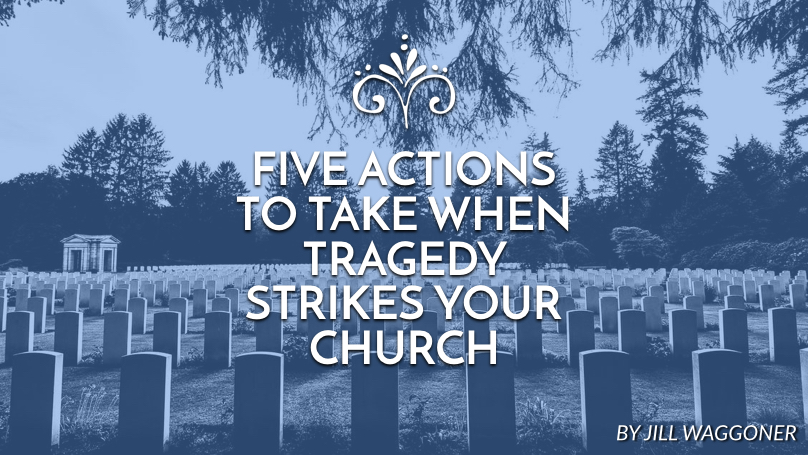My church body is currently in the midst of one of the greatest tragedies I’ve ever seen. Our community is suffering, mourning and asking difficult questions.
It’s been one of the most exhausting weeks we’ve ever experienced in ministry. In many ways, we have felt unqualified for the task before us. Yet, my husband faithfully visited grieving family members, counseled church members in office and by phone, led our church staff through their sorrow and preached a funeral—all in a span of five days.
As a pastor’s wife, when tragedy strikes your church body, it strikes your husband’s heart and mind. In the overflow, it strikes your home. When so many have experienced a personal loss, your sufferings might be overlooked during a time of crisis. Rightly so. However, it does not diminish the difficulty of the days for you and your husband.
As we weather this current storm, we are clinging to truth in order to minister well and take care of our own bodies and souls. I pray these five actions we’re taking provides you encouragement in whatever you also may be facing.
1. Recognize the spiritual battle.
Begin with Ephesians 6. Every tragedy involves people. At times, it’s easy to see a person as an enemy that caused your sorrow. It’s better to avoid this temptation. The truth found in Ephesians 6 allows us to remove antagonists and protagonists from the narrative and rightly focus our eyes on and prayers against the devil’s schemes.
“Put on the full armor of God, so that you can take your stand against the devil’s schemes. For our struggle is not against flesh and blood, but against the rulers, against the authorities, against the powers of this dark world and against the spiritual forces of evil in the heavenly realms. Therefore put on the full armor of God, so that when the day of evil comes, you may be able to stand your ground, and after you have done everything, to stand” (Ephesians 6:11-13).
2. Soak in the gospel.
My husband and I have read and re-read Romans 8 together. Its reminders of what Christ has done for us, that the Spirit is alive in us and of how the Spirit and Christ intercede for us offer such sustaining grace.
No matter what we may face, “neither death nor life, neither angels nor demons, neither the present nor the future, nor any powers, neither height nor depth, nor anything else in all creation, will be able to separate us from the love of God that is in Christ Jesus our Lord” (Romans 8:38).
And this too is what we have to offer others in their grief.
As C.S. Lewis wrote in the introduction of The Problem with Pain, “when pain is to be borne, a little courage helps more than much knowledge, a little human sympathy more than much courage and the least tincture of the love of God more than all.”
3. Create temporary boundaries.
When your church body is in the midst of crisis, many are affected. Everyone and everything feels urgent. However, there are logistical and physical limits to you and your husband’s ability to respond to all requests for counsel while still maintaining your own rest and emotional energy.
Likely you and your husband will need to set boundaries with people for a period of time in order to minister to those truly affected. Tragedies will reveal those who are ill-equipped to handle trials. You will need wisdom to discern who they are and set boundaries.
4. Rest.
My husband and I have done everything we can to rest well these days including cancelling some morning appointments and leaving housework undone. Some evenings, my husband turns off his phone for a few hours to be with our children. We do this because we know we will need physical strength to sustain our emotional strength.
Even though I spend most of my days at home, I ask for help on weeks like this. I call the sitter. I order take-out. I simplify our life as much as possible so that when my husband is home I can give him my emotional energy.
“But the Lord is faithful, and he will strengthen you and protect you from the evil one” (2 Thessalonians 3:3).
5. Call in the troops.
This might not be able to happen right away, but as soon as possible, I seek to create life-giving scenarios for me and my husband. I invite over friends who are easy and understanding. I sit at a friend’s kitchen table and let the kids play. I ask our parents to come to town. Whatever others offer, take advantage of it. We are made for community and are strengthened by community.
In the midst of such sadness, God provided people who encourage me and my husband. We have seen how He sustains us through the prayers of those we didn’t know were praying. We have seen our church body serve and love and encourage each other in ways that blessed us as well. We can see God working in so many lives through this experience, redeeming what was meant for evil. We are left knowing He “will bring it to completion at the day of Jesus Christ” (Genesis 50:20; Philippians 1:6).
Published August 10, 2017



